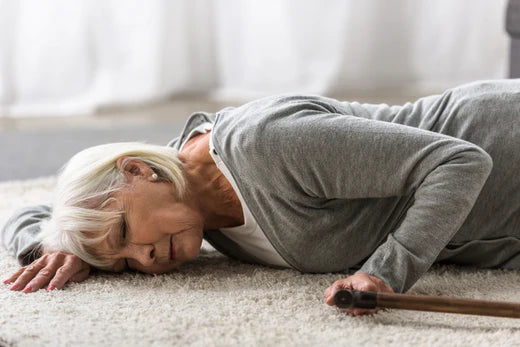Beyond the Fall: Effects on Independence & Well-Being

Falls are not just physical events; they can send shockwaves through every aspect of life, profoundly impacting independence, emotional well-being, and social connections. In this blog post, we'll delve into the multifaceted effects of falls on independence, exploring the far-reaching consequences of fear, isolation, and loneliness that can follow in their wake.
The Fear Factor: Understanding Fear of Falling
-
A Vicious Cycle: Fear of falling can develop after a fall or after a diagnosis of Osteoporosis or Osteopenia, leading to a heightened sense of vulnerability and anxiety. This fear can create a self-perpetuating cycle of avoidance and restriction, limiting mobility and eroding confidence.
-
Psychological Impact: Fear of falling can take a toll on mental well-being, contributing to feelings of helplessness, anxiety, and depression. It is important to address these concerns for overall quality of life.
Activity Avoidance: The Cost of Inaction
-
Curbing Engagement: The fear of falling often leads to the avoidance of activities deemed risky, such as walking, exercising, or participating in social events. This reluctance to engage in activities can result in decreased physical fitness, social isolation, and a decline in overall quality of life.
-
Loss of Independence: As activity levels decline, so too does independence. There is the domino effect of inactivity on daily living tasks, mobility, and self-care, highlighting the importance of addressing barriers to participation to preserve independence.
The Loneliness Epidemic: Navigating Social Isolation
-
Disconnected and Alone: Falls can contribute to social isolation and loneliness, as individuals may become increasingly reluctant to venture out or engage with others. The impact of social isolation on mental health, cognitive function, and overall well-being is significant.
-
Breaking the Cycle: Addressing social isolation requires proactive measures to foster connections and build community support networks. From joining social groups to embracing technology for virtual connections, there are a number of ways to stay connected and avoid the negative effect of social isolation.
Empowering Independence: Breaking Free from the Fall
-
Education and Awareness: Empowering individuals with knowledge about fall prevention strategies and resources can help alleviate fears and build confidence. There are a number of proactive approaches to fall prevention and you can find out more here about some of the things to think about.
-
Supportive Environments: Creating safe and supportive environments, both at home and in the community, is essential for promoting independence and well-being. The Bone Health & Osteoporosis Foundation offer many resources that can help.
Charting a Path Forward
Falls can have far-reaching consequences beyond the physical injury, impacting independence, social connections, and emotional well-being. By understanding the complex interplay of fear, activity avoidance, and social isolation, we can take proactive steps to break free from the fall and reclaim independence. Together, let's build communities that support and empower individuals to live life to the fullest, free from the constraints of fear and isolation.
